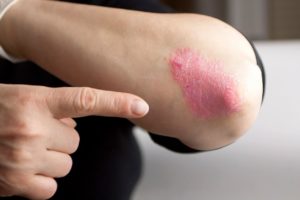3 Cold-Weather Phenomena That Cause Psoriasis Flare-Ups

As the year advances toward fall and winter, temperatures begin to cool. If you are one of over 7 million Americans who suffer from psoriasis, you may notice a change in your psoriasis symptoms during this time. Some sufferers experience an increase in the number of outbreaks. Others see their symptoms worsen.
You can better manage psoriasis symptom flare-ups when you understand how cold weather impacts your condition. Take a look at these three cold-weather phenomena that cause psoriasis flare-ups.
1. Dry Air
soriasis commonly produces plaques, or dry patches of skin caused by an autoimmune response that grows new skin too quickly. The dry, itchy nature of plaque psoriasis can worsen in certain environmental conditions, such as when humidity levels drop.
Fall and winter are ideal times for humidity levels to drop outdoors and indoors. Cooler air outdoors naturally holds less moisture. Forced air heat inside your home and car make air even drier. These conditions aggravate already dry, itchy skin and cause flare-ups severe enough for skin to crack and bleed.
You can stay on top of dry winter skin with a few simple actions this fall. Increase your use of moisturizers, especially after you shower or bathe when skin cells are full of water. Look for products that treat psoriasis, or ask your dermatologist for recommendations. Then, use a humidifier inside your home to boost humidity levels. Run your humidifier at night while you sleep if you are absent from your home during the day.
2. Shorter Daylight Hours
Winter days are synonymous with early sunsets and fewer daylight hours. This decrease in daylight translates to less UVB light from the sun. A lack of prolonged sun exposure may make your psoriasis worsen. UVB rays kill immune cells that cause psoriasis. Also, light may slow down the production of skin cells or interrupt signals between immune cells and skin cells that lead to the familiar red, dry, or crusty symptoms.
Few people realize the association between skin and vitamin D your body generates during exposure to sunlight. Vitamin D is known to boost your immune system, a handy defense for your body’s autoimmune tendency to form plaques. Even ointment with Vitamin D as a topical remedy helps lessen psoriatic skin lesions.
You can increase the time you spend in the sun to help your skin absorb move UVB rays and produce healing Vitamin D. If sun exposure is not possible, ask your dermatologist about phototherapy that mimics sunlight to produce similar effects.
3. Colds and Flu
Fall and winter are prime seasons for cold bacteria and flu viruses to make their stuffy, sneezy, feverish rounds. Unfortunately, bacterial and viral infections can disrupt an already hyper-sensitive immune system in people with psoriasis.
Cold and flu infections can make psoriasis symptoms worsen. While you suffer from a cold, your psoriasis might spread from one small area to cover most of an arm or leg. Or your joint stiffness increases and hinders your ability to walk, move, or use your hands.
You can take an active role to avoid many common flu or cold infections this fall and winter. Strengthen your body’s ability to fight infections and get plenty of rest. Drink lots of water, and try to eat healthy. Keep warm in cold areas and wear several layers of cotton clothing rather than itch- aggravating wool.
Finally, exercise regularly to keep healthy, and avoid smoking and alcohol, which can cause flare-ups even without the hindrance of an infection. Discuss these and other ways you can avoid psoriasis flare-ups with a dermatologist at East Carolina Dermatology and Skin Surgery, PLLC. Our dedicated team is ready to help you manage your psoriasis symptoms with several treatment options.
